How To Clean Makeup Brushes After Each Use
This is painful to admit, but there was a time in my life when I didn't clean my makeup brushes, and god, did my skin hate me. I blamed everything under the sun for the frustrating whiteheads that cropped up by the end of each day—including (but certainly not limited to) school assignments, high-school ~romance~, and cheese. But in retrospect, the fact that my dirty brushes were caked in years worth of foundation, skin oils, and bacteria—yum!— was absolutely not helping my skin issues.
My breakouts were actually one of the many reasons I've, quite literally, devoted my life to writing about beauty (it's all about the sacrifices, people). And now that I'm on the other side, I'm determined to teach you how to clean makeup brushes correctly so they look as good as the day you got 'em—and, more importantly, so you stop exposing your skin to acne-causing bacteria and irritating grime. Keep scrolling to learn everything you need to know about how to clean your makeup brushes, with insight from skin and makeup experts. Fear not—it's really, truly uncomplicated.
How often should you clean makeup brushes?
The plain-and-simple verdict: often. "Ideally, you'd wash all of your makeup tools every single day, but I know this is unrealistic," says dermatologist Geeta Yadav, MD, founder of Skin Science Dermatology. So instead, Dr. Yadav recommends cleaning your makeup brushes once a week. "Make it a Sunday-night activity so that you can start your week off fresh," she says. FWIW, the American Academy of Dermatology also recommends washing your makeup brushes every seven to 10 days—yup, even if you used them just once.
"Whether you're using your makeup brushes once a month or once a day, brushes saturated with liquid makeup create an environment that allows bacteria to grow," says dermatologist Joshua Zeichner, MD, associate professor of dermatology and director of cosmetic & clinical research at Mount Sinai Hospital. "Theoretically, a contaminated brush left to sit for a month has that much time to allow bacteria to flourish," he adds, "so using it less frequently doesn't necessarily influence how much contamination it has."
Feelin' lazy? "If you're really not in the mood to wash everything weekly, know that powder-based makeup products don't facilitate bacteria growth as easily as cream-based ones," says Dr. Yadav. "So [technically] you could stretch washing any brushes and tools that you solely use to apply powders to two weeks instead of one—but I wouldn't risk it."
How often do you need to clean makeup sponges?
FYI, you're not spared from the cleaning process if you use makeup sponges either. In fact, you should wash your sponges even more frequently than your brushes, like, after every single use. Why? Well, since it's ~literally~ a sponge, it's designed to soak up everything it comes in contact with—and that includes the gross stuff.
Sadly, sponges don't have a superpower of distinguishing between foundation and bacteria, even if that sponge is stamped with the word "antimicrobial." In reality, antimicrobial just makes the sponge/tool/surface a less-than-ideal environment for bacteria to fester—but it definitely doesn't prevent 100 percent of growth, especially if it sits unwashed for months.
What should you clean makeup brushes with?
All you need to clean your makeup brushes is water and either a gentle soap or a brush cleanser. And not to overwhelm you, but there are approximately hundreds of options out there, so even though choice is ~yours~, just make sure to steer clear of harsh formulas, like cleansers filled with fragrance and dyes, says Dr. Zeichner. Remember—you're rubbing these bristles across your face; you don't want to irritate your skin. Need some options? I gotchu.
The makeup brush cleaners you need ASAP

Cinema Secrets Pro Cosmetics Professional Brush Cleaner


Ecotools Makeup Cleaner for Brushes
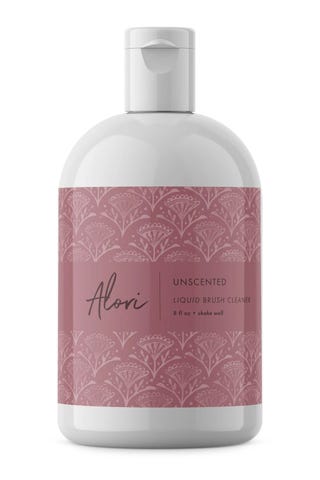
Alori Unscented Petite Liquid Brush Cleaner
aloricollection.com
$26.00
Can dirty makeup brushes cause acne?
Yes, dirty makeup brushes can cause acne—plus irritation, inflammation, and even infections in worst-case scenarios. "It's not just your beauty products and brushes that harbor microbes—your skin is also covered with germs," says Dr. Yadav. "The constant transfer of microbes between your beauty products, tools, and skin can have some serious long-term ramifications." One potential and very real ramification? Blepharitis, a fancy medical term for eyelid inflammation. Not ideal.
Pro makeup artist Lindsey Williams also agrees with a once-a-week washing ritual. She warns that besides upsetting your skin, using cake-y, oil-filled brushes will also mess with your makeup application. "Using dirty brushes can cause your makeup to look spotty and chunky, and even mess with your makeup products," she says. Basically, rubbing and ripping that grime-covered brush into your favorite cosmetics is an easy way to infect them or destroy them.
Got all that? Feel like cleaning your makeup brushes? Good. Let's proceed.
How to clean makeup brushes, step by step:
Screenshot these six steps to give your makeup brushes the thorough clean they deserve.
Step 1: Wet the bristles
Run the bristles of your makeup brush under lukewarm water, avoiding the ferrule (the metal portion that holds your brush together) and handle.
Step 2: Add cleanser
Apply a tablespoon-size drop of makeup brush cleaner to the palm of your hand or to a brush-cleansing mat. Using a solid bar cleaner? Just hold it in your hand.
Step 3: Saturate the bristles in cleanser
Swirl your makeup brush around the cleanser until it's fully coated and saturated. If you're using a solid cleanser, massage the brush across the top until you create a lather.
Step 4: Rinse and repeat (if needed)
Run the bristles under water with the makeup brush head facing downward, continuing to avoid wetting the handle and ferrule. If the water coming out of the bristles is pigmented, repeat steps 2 and 3 until it runs clear.
Step 5: Remove excess water
With the bristles facing down, gently squeeze on them with your fingers or a towel to remove excess water. Be thorough—leaving your brushes wet will damage them.
Step 6: Let air-dry
Let your makeup brushes dry by laying them flat on a towel and leaving them for 6 to 12 hours—ideally overnight.
Can I DIY my makeup brush cleaner?
If you love a DIY project, you can also concoct a makeup brush cleaner with basic kitchen ingredients. One of the most popular methods is using olive oil and dish soap, which helps condition your bristles while stripping them of gunk and bacteria.
This content is imported from YouTube. You may be able to find the same content in another format, or you may be able to find more information, at their web site.
Do makeup brush cleaning mats work?
Listen, all you really need to clean your makeup brushes is water and a cleanser, but if you want to make the process faster/easier/more fun (depending on what you choose), you can totally invest in tools to help.
Some of the most popular are textured silicone mats that help loosen and (gently) scrub away buildup; bar cleansers designed to deep-clean your makeup sponges, and perhaps the most helpful of all, makeup-brush drying racks. They make it easy to hang your brushes upside so water doesn't pool around the base of the bristles and dissolve the glue.
Tools that'll make you *want* to clean your brushes
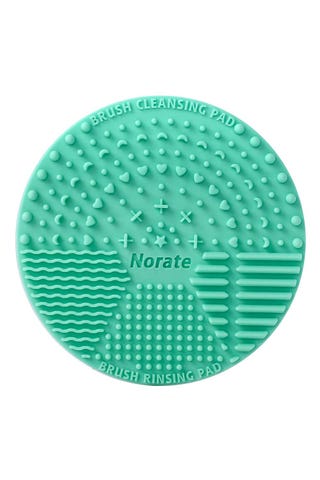
Norate Brush Cleaning Mat
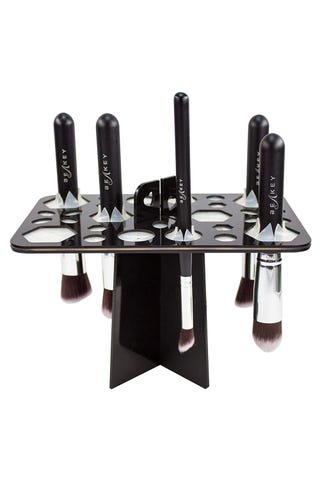
Beakey Collapsible Makeup Brush Holder
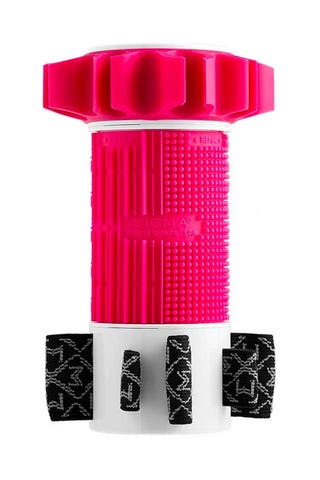
Sigma Beauty Dry'n Shape Spa Makeup Brush Cleaning Tool
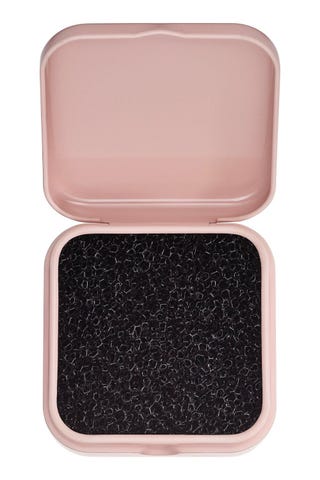
Fenty Beauty Dry Brush Cleaning Sponge
Can you use shampoo to clean makeup brushes?
Yes, you can use certain shampoos to clean your makeup brushes, but, uh, you should probably reserve your precious Olaplex or potent-smelling formulas exclusively for your hair. Gentle, fragrance-free baby shampoo will do the trick, without leaving behind skin-irritating residue.
Just be sure that you rinse out all of the suds when cleaning your brushes. "When you're using household products, the sudsing is so different from a bar cleanser or makeup brush-specific soap," says Williams. She advises that you use a "very minimal amount" compared to how much you would with a "normal" brush cleanser (think: half as much), and make sure to rinse well.
Can you use Dawn dish soap to clean makeup brushes?
Yes and no. Dawn dish soap will definitely remove any caked-on, oily, or heavy buildup from your makeup brushes, but it can also damage some brushes in the process. So if you're going to use Dawn, make sure to only use it on synthetic brushes—not natural-bristle brushes. Why? Because "real" bristles are fragile, so they require something gentler. Williams compares them to the actual strands on your head and asks, "Would you use Dawn on your hair?" Exactly.
Of course, there are obvious differences between our hair and bristles, but the fact is, "the harsher the cleanser you use, the quicker your brushes will need to be thrown away because the bristles will get frayed, almost like split ends," says Williams.
How often should you replace your makeup brushes?
It's...complicated?! "Most makeup artists will tell you that if you wash your brushes regularly and care for them well, you can use them for years, but I disagree," says Dr. Yadav. "I recommend you replace your makeup brushes and sponges every three months as the bristles can retain germs, even if you're washing them regularly." Make you (and your wallet) cringe? I know.
So on the other hand, Williams says that she's owned some of her makeup brushes for 15 years. "I take really, really good care of my brushes," she says. "People should know that if you wash them properly and take good care of them, you can have them for years." For the record, she's not just saying this because she loves her brushes. Williams is the co-founder of The Makeup Standard, an organization created to "inform makeup artists how to reduce the possibility of infection and spread of microbes." So, you know, an actual expert.
How often should you replace your makeup sponges?
As for sponges, Dr. Yadav advises that you replace them every three months minimum , which probably doesn't come as much of a shock as her stance on makeup brushes. "They're much harder to clean thoroughly due to their highly porous nature," she explains. In other words, since you can't physically scrub the inside of your makeup sponge, you never know just how clean it's really getting—or what nasty bacteria and oils are still hangin' out inside.
The bottom line
Now that I've sufficiently stressed you out, I encourage you to think about how frequently you actually wash your brushes. Have you never washed them (that ought to change now, ahem), or are you obsessively cleaning them like your life depends on it? Either way, bookmark this guide, screenshot those steps, and get sudsing.
This content is created and maintained by a third party, and imported onto this page to help users provide their email addresses. You may be able to find more information about this and similar content at piano.io
How To Clean Makeup Brushes After Each Use
Source: https://www.cosmopolitan.com/style-beauty/beauty/how-to/a799/how-to-clean-your-makeup-brushes-0110/
Posted by: clementexquided.blogspot.com

0 Response to "How To Clean Makeup Brushes After Each Use"
Post a Comment